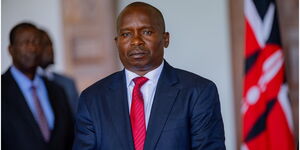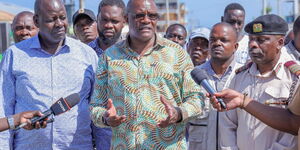President William Ruto on Tuesday held talks with Somalia's Foreign Minister Ali Mohamed Omar moments after Ethiopia became the first country to recognise the sovereignity of Somaliland.
In a statement, the Head of State indicated that the meeting, which was also attended by South Sudan special envoys General Akol Koor Kuc and General Simon Makuac Yen, centred around bolstering trade across the region.
Specifically, Ruto indicated that plans to resolve regional conflicts and boost the fight against al Shabaab militia dominated the discussion.
"Kenya is committed to enhancing cooperation with Somalia and South Sudan on matters of mutual interest," announced the Head of State in what may be perceived as a counter-offensive against the Ethiopian-Somaliland deal.
"Our goal is to expand trade, secure the stability and prosperity of East Africa by working together to combat terrorism, resolve conflicts, and build a durable peace across our region."
The meeting comes barely a day after Ethiopia and Somaliland signed a deal allowing the former to access the latter's Red Sea port of Barbera.
Speculations indicated that the deal will disadvantage the upcoming Lamu Port, South Sudan, Ethiopia Transport Corridor (Lapsset) project, which was expected to connect Ethiopia to the coastal ports of Lamu and Mombasa.
The deal stings, especially since Kenya has already invested Ksh75 billion in the Lamu Port but now risks diminished returns.
Across the border, the deal also unsettled the Somali Government, whose President, Hassan Sheikh Mohamud, claimed that it paved the way for the resurgence of terror activities across the region.
Addressing Somalia’s bicameral Parliament in Mogadishu, the Head of State argued that the deal may prompt Al Shabaab to recruit new members. Previously, Kenya had been both a fertile ground for recruitment as well as a victim of the attacks.
According to local media houses, Mohamud further claimed that the emergence of the militia group stemmed from Ethiopia's invasion of Somalia in 2006.
Since then, regional countries working under the African Union Transition Mission in Somalia (ATMIS) have staged combat against Al Shabaab for years.
The threat, however, comes at a time when Defence Cabinet Secretary Aden Duale pledged to ensure that Kenya continues to be a secure country in an insecure neighbourhood.
Since the three major attacks of Westgate, Dusit D2 and Garissa University, the country made requisite changes in the National Intelligence Service and Kenya Defence Forces to fight the militia groups, including the recruitment of more intelligence and groundsmen.
"Kenya as a country is a very secure stable nation but we live in a very insecure neighbourhood. The biggest challenge in our region is terrorism and extremist forces," Duale explained during a December 2023 interview on the national broadcaster.
"The Al Shabaab, to be specific and secondly, the proliferation of small arms and large weapons, you'll find drug and human trafficking, the emergence of criminal gangs. These are the challenges we face but I can authoritatively say that outside the challenges we have with Al Shabaab, the rest we are managing. In the last year as a country, we have managed Al Shabaab."












